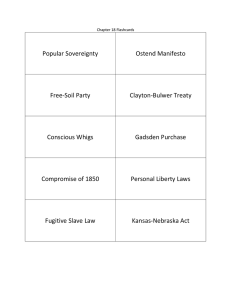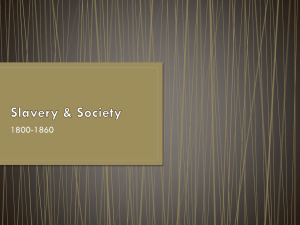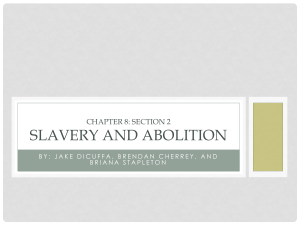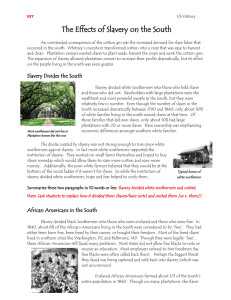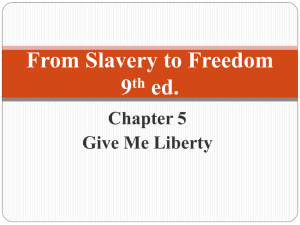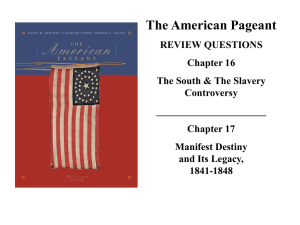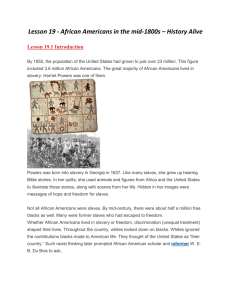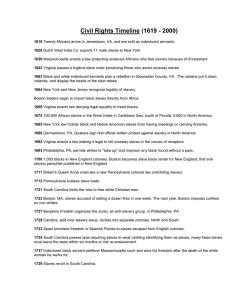US HISTORY Midterm Review 2013 II
advertisement
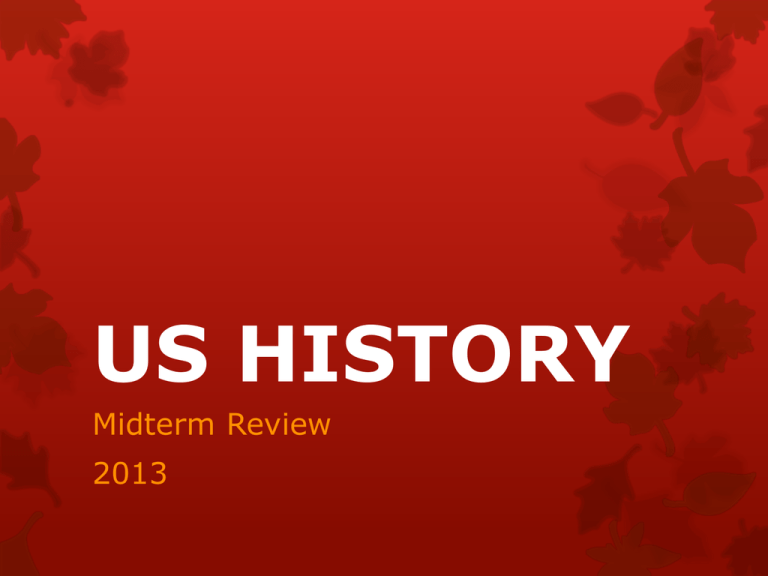
US HISTORY Midterm Review 2013 1. Africans primarily came to early European settlements in America a. looking for trading partners b. Voluntarily c. as slaves d. to find employment 2. From where did the earliest humans to visit North America probably come? a. The Middle East b. Siberia c. Mesopotamia d. Greece 3. The histories of most early American people have been preserved in a. written documents b. Artwork c. European records d. oral traditions 4. Most African immigrants to the Americas came from a. North Africa b. South Africa c. the continent's eastern regions d. the continent's western regions 5. Slave status in Africa was a. generally permanent b. Voluntary c. transferred from parent to child d. not necessarily permanent 6. Which disease was NOT exported from Europe to America? a. Syphilis b. Smallpox c. Plague d. Typhus 7. In their search for a marketable product, colonial settlers began growing this after 1610. a. Tobacco b. Lettuce c. Corn d. Wheat 8. This group was among the most successful in adapting to the Native American understanding of trade, for they knew that good relations were essential to maintaining and increasing their business. a. The English b. The Spanish c. The French d. The Italians 9. People of mixed Indian and Spanish descent were called a. mulattos b. marzipans c. mestizos d. makos 10. Merchants brought sugar byproducts back to New England to be distilled into a. schnapps b. rum c. gin d. vodka 11. What caused Britons to decide Americans should carry more of England's financial burden? a. Colonial demands for greater political representation b. Expenses occurred during the French and Indian War c. The growth of the colonial economy d. none of the above 12. Who composed the first draft of the Declaration of Independence? a. Thomas Paine b. John Adams c. George Washington d. Thomas Jefferson 13. France's main goal in aiding the Americans was to a. protect their fur trade b. weaken the British c. establish trading partners d. regain Canada 14. A particularly cruel aspect of the internal slave trade was that it a.required minimum sale prices b.only sold slaves from the Upper South c.resulted in the passing of slave codes d.separated slaves from their families 15. Which statement would most likely have been said by a believer in manifest destiny? a. "God can never rest easy with our nation until we challenge and defeat slavery“ b. "It is only through Christian kindness that we can achieve peace with the Indians" c. "It is our God-given right to spread our democracy and culture across the continent" d. "The ways of the factory represent America's greatest hope for a better future" 16. Proponents of popular sovereignty believed that a.residents of a territory should decide the issue of slavery b.presidential elections should not be decided by the electoral college c.all slaves should be declared free d.Southerners were too unreasonable for a fair debate on slavery 17. The Compromise of 1850 established all of the following statutes EXCEPT a. popular sovereignty in Utah b. admission of California as a free state c. the Fugitive Slave Act d. admission of New Mexico as a slave state 18. The influential novel, Uncle Tom's Cabin, was written by a. Frederick Douglass b. Angelina Grimke c. Hinton Rowan Helper d. Harriet Beecher Stowe 19. As a novel with social power, Uncle Tom's Cabin succeeded because it a. never directly addressed the moral issues of slavery b. portrayed Southerners as virtuous defenders of freedom c. presented real characters and not just abstract arguments d. included symbolism which was difficult to interpret 20. Who was an antislavery agitator in the middle of the violent confrontation in Kansas? a.John Brown b.Hinton Rowan Helper c.Frederick Douglass d.Charles Sumner 21. Which statement would most likely have been said by creators of the Republican Party? a. "State's rights were the foundation of this great republic and they must remain so“ b. "We welcome ex-southern Democrats as the foundation and backbone of this party“ c. "The extension of slavery must be stopped, for it is the largest issue facing our nation“ d. "If the people would follow the wise counsel of President Pierce, we would be at peace" 22. In the controversial Dred Scott decision, the Supreme Court declared that a.only the national government could end slavery in new territories b.blacks were not citizens of the United States c.Dred Scott had the right to sue, but not the right to freedom d.blacks were only free when they entered free territory 23. John Brown hoped that his raid on Harper's Ferry, Virginia, would a. cause the government to support the Lecompton Constitution b. cause the resignation of James Buchanan c. force governments of the South to voluntarily emancipate slaves d. start a slave rebellion in the state of Virginia 24. Copperheads were a.Southerners who worked to sabotage the Confederate cause b.Northern Democrats suspected of having Confederate sympathies c.members of the Confederate Congress who wished to negotiate peace d.slaves who escaped to freedom and joined the Union army 25. Which statement about the Fourteenth Amendment is NOT true? a.It guaranteed all males the right to vote b.It strengthened the Civil Rights Act of 1866 c.It guaranteed all citizens equality before the law d.It was opposed by President Johnson 26. The Fifteenth Amendment a.officially ended slavery in the United States b.guaranteed the right of American men to vote c.established new rules for readmission of southern states d.gave Congress the power to remove presidential cabinet members 27. The decision in the Plessy v. Ferguson case a.had little actual effect on legislative actions in the South b.was issued with the unanimous support of the Court c.led to enactment of institutional segregation in the South d.placed segregation in the forefront of national political debate 28. Grandfather clauses and poll taxes were used to a.exclude women from joining the Populist Party b.deny blacks the right to vote c.equalize wealth between poor and wealthy farmers d.stop blacks from migrating to the North 29. The immigrants known as new immigrants included all of the following groups EXCEPT a.Irish Protestants b.Poles c.Russian Jews d.Italians 30. Which statement best describes the cultures of the tribes that lived throughout the West? a. A wide spectrum of tribes had successfully adapted their lives to a variety of environments b. Village Indians were having a difficult time living within the balance of nature c. Most tribes had a difficult time surviving without the benefits of technology d. The tribes shared the same rituals in regions from the Mississippi to the Pacific 31. Rationales for imperialism in the era 1890-1910 included all of the following ideas EXCEPT a.the United States needed a vast buffer zone to offset communist expansionism b.American prosperity now depended on larger access to foreign markets and resources c.the spread of Christianity would help lesser nations develop morally d.American ideas and institutions were superior to those of inferior nations 32. During the fighting of the Spanish-American War, a. American troops had experienced commanders b. more American fighting men died of disease than were killed in action c. regular army units did more of the fighting than did National Guard units d. the U.S. Army conducted a competent and efficient mobilization 33. The group of crusading journalists of the late 1800s and early 1900s who attacked corruption in business and government were called a.yellow journalists b.Wobblies c.muckrakers d.mugwumps 34. The progressive measure that gave voters the right to remove a public official from office through special election was a.initiative b.referendum c.direct primary d.recall



